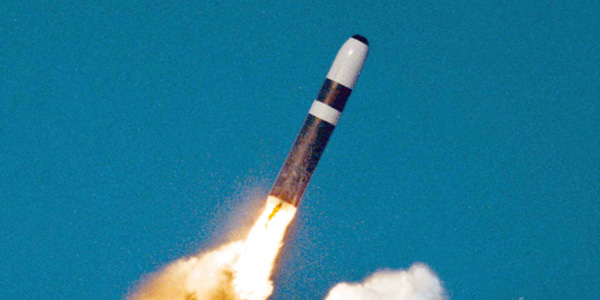Searching for Cuts, Congress Spars Over Nuclear Weapons
More lawmakers are raising questions about whether the U.S. should spend billions on an arms race that ended years ago

As the congressional "supercommittee" moves toward recommendations to cut over $1 trillion from the government's budgets, House members have squared off over whether some savings can come from the hundreds of billions of dollars planned for nuclear weapons over the next 10 years.
The first shots were fired on Oct. 11, when Rep. Ed Markey (D-Mass.) sent a letter to the 12 members of the supercommittee (officially the Joint Select Committee on Deficit Reduction) signed by 65 lawmakers. The signers, including some from the House Armed Services Committee, were clear and to the point:
"The Berlin Wall fell. The Soviet Union crumbled. The Cold War ended. Yet 20 years later, we continue to spend over $50 billion a year on the U.S. nuclear arsenal. This makes no sense. These funds are a drain on our budget and a disservice to the next generation of Americans. We are robbing the future to pay for the unneeded weapons of the past."
They argued it is time for "restructuring the U.S. nuclear program for the 21st century," recommending cutting $200 billion from the estimated $700 billion planned for nuclear weapons and related programs over the next 10 years.
The day he sent the letter, Markey made an impassioned plea on the House floor, saying, "Now is the time to reset our priorities and invest in the people and programs to get America back on track."
Rep. Michael Turner (R-Ohio) fired back later that day. The proposed cuts "would gamble with our national security," he argued. "At a time when Russia and China are engaging in significant nuclear modernization programs and North Korea and Iran continue their illegal nuclear weapons programs, what Mr. Markey proposes amounts to unilateral disarmament of the U.S."
Turner is worried about waning support for the programs he oversees as chair of the House Armed Services Subcommittee on Strategic Forces. Markey and the co-signers of his letter aren't the only lawmakers Turner should be concerned about.
The House Appropriations Committee cut funding for nuclear warheads and weapons material production by almost 7 percent from the President's request, or $498 million. The corresponding Senate subcommittee cut just a tad less -- $440 million -- from the same programs. Members are increasingly troubled by rising costs, slipping schedules and questionable need for new weapons production plants. "The Committee is concerned about the escalating costs for two new nuclear facilities to handle plutonium and uranium," the Senate report noted.
Turner and nine Republican House colleagues urged the Senate to restore all funding, claiming that money was being diverted from nuclear programs to "water projects." His efforts are unlikely to succeed, but this is just the beginning of what is likely to be a multi-year battle over the future of the U.S. nuclear arsenal. Fiscal crisis, contracting defense spending and a shrinking Russian arsenal -- the main justification for maintaining thousands of U.S. warheads -- are combining to put unprecedented pressure on nuclear budgets.
The battles will be fierce. The two sides cannot even agree on how much the government spends on nuclear weapons. Turner claims that U.S. nuclear programs will cost $212 billion over the next 10 years. Markey estimates $700 billion.
The confusion is understandable. There is no unified, transparent nuclear-weapons budget. Budgets are spread out over multiple accounts. Congress and the president do not actually know how much we spend. Studies by independent experts from the Brookings Institution, the Carnegie Endowment and other institutes conclude that the U.S. spends at least $54 billion annually on nuclear weapons and related programs, a total that includes missiles, bombers, submarines, warheads, anti-missile programs, environmental clean-up from nuclear production, and other initiatives.
Adjusted for inflation, those annual budgets total over $600 billion over the next decade. In addition, the Obama administration plans to spend over $100 billion over 10 years on new weapons and warhead production plants, so Markey's estimate is accurate by reliable accounts.
The debate makes clear that Congress needs a unified nuclear weapons budget to make responsible decisions, and it needs a clear plan for our weapons. Why, for example, is the Navy planning to spend an estimated $350 billion to build and operate a new fleet of nuclear-missile submarines that would deploy 800 nuclear warheads at sea well past the middle of this century? How does this square with the U.S. plans to reduce the roles and missions of nuclear weapons?
Markey and Turner have started an important debate with far-reaching consequences. Their exchanges this week already points to one obvious conclusion: Until Congress gets an accurate nuclear budget and a clear deployment plan, it shouldn't approve new weapons and new production plants.
Image credit: Reuters